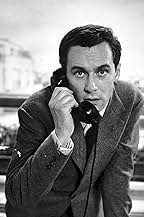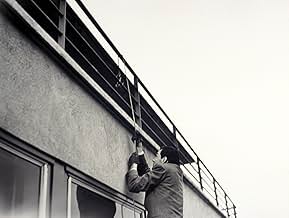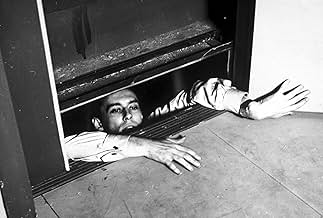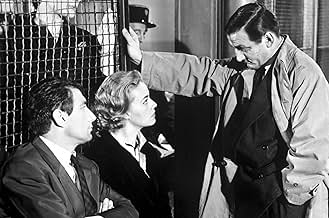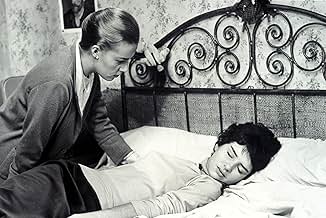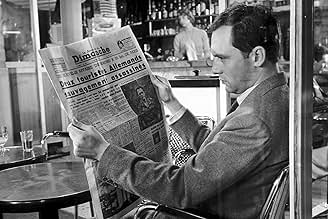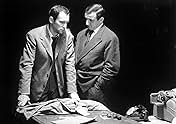IMDb रेटिंग
7.9/10
31 हज़ार
आपकी रेटिंग
एक आत्मविश्वासी बिजनेसमैन अपने बॉस, जो उसकी प्रेमिका का पति है, उसकी हत्या कर देता है, जिससे अनजाने में ही दुर्भाग्यपूर्ण घटनाओं की एक शृंखला बन जाती है.एक आत्मविश्वासी बिजनेसमैन अपने बॉस, जो उसकी प्रेमिका का पति है, उसकी हत्या कर देता है, जिससे अनजाने में ही दुर्भाग्यपूर्ण घटनाओं की एक शृंखला बन जाती है.एक आत्मविश्वासी बिजनेसमैन अपने बॉस, जो उसकी प्रेमिका का पति है, उसकी हत्या कर देता है, जिससे अनजाने में ही दुर्भाग्यपूर्ण घटनाओं की एक शृंखला बन जाती है.
- पुरस्कार
- कुल 1 जीत
फ़ीचर्ड समीक्षाएं
Elevator to the Gallows is a great film and even better, has a short running time! The acting is great in every instance, the plot is original, and the direction is probably among the best I've ever seen. I loved how the plot had a lot of twists but there weren't so many that you were confused as to what was going on. Although I won't reveal the ending, I thought it was great and made me smile. However, you have to like this type of movie to see it, as it is kind of complicated and there isn't a ton of action. This film shows how the perfect murder can be only planned so well; you can never plan what could happen. If you don't get bored too easily, stick with this gem and I'm sure you'll love it.
Ascenseur pour l'échafaud (AKA: Elevator to the Gallows/Lift to the Scaffold) is directed by Louis Malle and co-written by Malle, Roger Nimier and Noël Calef (novel). It stars Jeanne Moreau, Maurice Ronet, Georges Poujouly, Yori Bertin and Jean Wall. Music is by Miles Davis and cinematography by Henri Decaë.
A little ole devil this one, a sly slow pacer that itches away at your skin. Rightly seen as a bridging movie between the classic film noir cycle and the nouvelle vague, Malle's movie is in truth straightforward on narrative terms. Julien Tavernier (Ronet) is going to kill husband of his lover, Florence Carala (Moreau), who also happens to be his boss, but upon executing the perfect murder, he, through his own absent mindedness, winds up stuck in a lift close to the crime scene. Outside Florence is frantically awaiting his arrival so as to begin their life together in earnest, but when a couple of young lovers steal Julien's car, Florence gets the wrong end of the stick and a sequence of events lead to Julien and Florence hitching that ride to the gallows.
Simplicity of narrative be damned, Malle's movie is a classic case of that mattering not one jot. There is style to burn here, with bleak atmospherics dripping from every frame, and Miles Davis' sultry jazz music hovers over proceedings like a sleazy grim reaper. The ironic twists in the writing come straight off the bus to noirville, putting stings in the tale, the smart reverse of the norm finding Moreau (sensual) wandering the streets looking for her male lover, while elsewhere he's in isolation and a doppleganger murder scenario is cunningly being played out. Decaë's photography has a moody desperation about it that so fits the story, the use of natural light making fellow French film makers sit up and take notice. While the dialogue, and the caustic aside to arms dealings, ensures we know that Malle can be a sly old fox. He really should have done more noir like pictures.
A film that convinces us that Julien and Florence are deeply in love and passionate about each other, and yet they never are once together in the whole movie! It's just one of the many wonderful things about Louis Malle's excellent picture.
Remember folks, the camera never lies... 9/10
A little ole devil this one, a sly slow pacer that itches away at your skin. Rightly seen as a bridging movie between the classic film noir cycle and the nouvelle vague, Malle's movie is in truth straightforward on narrative terms. Julien Tavernier (Ronet) is going to kill husband of his lover, Florence Carala (Moreau), who also happens to be his boss, but upon executing the perfect murder, he, through his own absent mindedness, winds up stuck in a lift close to the crime scene. Outside Florence is frantically awaiting his arrival so as to begin their life together in earnest, but when a couple of young lovers steal Julien's car, Florence gets the wrong end of the stick and a sequence of events lead to Julien and Florence hitching that ride to the gallows.
Simplicity of narrative be damned, Malle's movie is a classic case of that mattering not one jot. There is style to burn here, with bleak atmospherics dripping from every frame, and Miles Davis' sultry jazz music hovers over proceedings like a sleazy grim reaper. The ironic twists in the writing come straight off the bus to noirville, putting stings in the tale, the smart reverse of the norm finding Moreau (sensual) wandering the streets looking for her male lover, while elsewhere he's in isolation and a doppleganger murder scenario is cunningly being played out. Decaë's photography has a moody desperation about it that so fits the story, the use of natural light making fellow French film makers sit up and take notice. While the dialogue, and the caustic aside to arms dealings, ensures we know that Malle can be a sly old fox. He really should have done more noir like pictures.
A film that convinces us that Julien and Florence are deeply in love and passionate about each other, and yet they never are once together in the whole movie! It's just one of the many wonderful things about Louis Malle's excellent picture.
Remember folks, the camera never lies... 9/10
No need to recap the plot. The movie really represents a triumph of form over content. Seldom have I seen a smoother technique than director Malle shows here. The transition from scene to scene is almost seamless and keeps the viewer engaged regardless what's developing plot-wise. Then too, Decae's camera work shows how compelling natural lighting can be. The overall effect is one of effortless fluidity, a style well suited to lyrical subjects.
The trouble is the material itself is better suited to Hollywood B-movie techniques. In short, the material is jagged, while Malle's style is smooth, resulting unfortunately in a thriller drained of inherent drama. Note, for example, the elevator sequence, a predicament fairly bursting with suspenseful potential. Yet Malle's style does little to heighten the implicit desperation and even cuts away (though smoothly) from the mounting tension. To be fair, Ronet (Tavernier) adds nothing by remaining impassive throughout. (Perhaps paratroopers never sweat.) Thus the movie's dramatic centerpiece flattens out into just one more event among many.
Then there are the various misadventures of the free-spirited kids. They look cuddly, but remain amoral cyphers throughout, their double homicide coming across again as just one more event, no more important than Florence's (Moreau) dispirited walk up the avenue. In fact, the one time Malle highlights with his camera is that lengthy trudge through Paris, a director clearly fascinated by Moreau's distinctive appearance. Again, the style is smooth and polished, but also highly impersonal and homogenizing. I kept wishing one of Hollywood's noir masters like Nicholas Ray or Billy Wilder had gotten hold of the material first.
No need to go on apart from Malle about a sloppy script with its number of plot holes helpfully cited by other reviewers, or about overlooked details like a bullet to the head that raises no blood. All in all, I wonder how many folks would celebrate the film if it were not from France with Malle's name on it. Apart from its influence on French cinema, the movie does not wear well over time. Moreover, given the style he shows here, it's no surprise to me that Malle's breakthrough movie would be titled The Lovers rather than this over-civilized slice of thick ear.
The trouble is the material itself is better suited to Hollywood B-movie techniques. In short, the material is jagged, while Malle's style is smooth, resulting unfortunately in a thriller drained of inherent drama. Note, for example, the elevator sequence, a predicament fairly bursting with suspenseful potential. Yet Malle's style does little to heighten the implicit desperation and even cuts away (though smoothly) from the mounting tension. To be fair, Ronet (Tavernier) adds nothing by remaining impassive throughout. (Perhaps paratroopers never sweat.) Thus the movie's dramatic centerpiece flattens out into just one more event among many.
Then there are the various misadventures of the free-spirited kids. They look cuddly, but remain amoral cyphers throughout, their double homicide coming across again as just one more event, no more important than Florence's (Moreau) dispirited walk up the avenue. In fact, the one time Malle highlights with his camera is that lengthy trudge through Paris, a director clearly fascinated by Moreau's distinctive appearance. Again, the style is smooth and polished, but also highly impersonal and homogenizing. I kept wishing one of Hollywood's noir masters like Nicholas Ray or Billy Wilder had gotten hold of the material first.
No need to go on apart from Malle about a sloppy script with its number of plot holes helpfully cited by other reviewers, or about overlooked details like a bullet to the head that raises no blood. All in all, I wonder how many folks would celebrate the film if it were not from France with Malle's name on it. Apart from its influence on French cinema, the movie does not wear well over time. Moreover, given the style he shows here, it's no surprise to me that Malle's breakthrough movie would be titled The Lovers rather than this over-civilized slice of thick ear.
The best laid plans seldom consider the unexpected, with the most subtle of causes, the opportunities taken, resulting in profoundly unfortunate effects. An elegantly structured piece of story telling with sound, pictures and performances raised to the rafters, this is a piece of cinema you will struggle to shear away from and, with luck, it wont leave you hanging.
Greetings again from the darkness. The phrase Film Noir conjures up a certain feel and look and "Gallows" certainly captures what we have come to expect from the genre. However, the great director Louis Malle goes even further with his minimalistic approach to sound, lighting and dialog. Where 1944's "Double Indemnity" wreaks explosive on screen passion, Malle offers up a quiet simmering that draws the viewer into the lives of the main characters.
Jeanne Moreau is the perfect pouty French femme fatale. Her scenes of walking (wandering) the dark, rainy streets of Paris are chilling to watch for film lovers. The weak lighting and lack of make-up allow Moreau's true emotions to guide us. Malle also is tremendous in his filming of the elevator scenes with Maurice Ronet.
The secondary characters of the young lovers played by Yori Bertin (Veronique) and George Poujouly (Louis) are unmistakable in their likeness to Natalie Wood and James Dean. Watching two young kids carelessly destroy their own lives, as well as that of others, is quite the contrast to the well-conceived scheme of Moreau and Ronet.
I have not been able to come up with an apt description of the powerfully improvised jazz score from the legendary Miles Davis. The approach has been mimicked over the years, but never duplicated. It is startling in its ability to slap the viewer in the face! Moreau is of course a screen legend and went on to star in "Jules and Jim", Truffaut's "The Four Hundred Blows" and my personal favorite, "The Bride Wore Black". As great as she was in all of these, I am not sure her essence was ever better captured than her wandering through the Paris streets in "Elevator to the Gallows".
Jeanne Moreau is the perfect pouty French femme fatale. Her scenes of walking (wandering) the dark, rainy streets of Paris are chilling to watch for film lovers. The weak lighting and lack of make-up allow Moreau's true emotions to guide us. Malle also is tremendous in his filming of the elevator scenes with Maurice Ronet.
The secondary characters of the young lovers played by Yori Bertin (Veronique) and George Poujouly (Louis) are unmistakable in their likeness to Natalie Wood and James Dean. Watching two young kids carelessly destroy their own lives, as well as that of others, is quite the contrast to the well-conceived scheme of Moreau and Ronet.
I have not been able to come up with an apt description of the powerfully improvised jazz score from the legendary Miles Davis. The approach has been mimicked over the years, but never duplicated. It is startling in its ability to slap the viewer in the face! Moreau is of course a screen legend and went on to star in "Jules and Jim", Truffaut's "The Four Hundred Blows" and my personal favorite, "The Bride Wore Black". As great as she was in all of these, I am not sure her essence was ever better captured than her wandering through the Paris streets in "Elevator to the Gallows".
क्या आपको पता है
- ट्रिवियाMiles Davis recorded the music in a single recording session while he watched a screening. He composed it while watching a rough cut and then invited a quartet of French and US musicians in a for few hours (from 11pm to 5am one night), improvising each number and allegedly sipping champagne with Jeanne Moreau and Louis Malle.
- गूफ़When Florence arrives at the motel, the photos are just being developed - with the lights on! Exposing the prints to light before fixation would make them turn black. By the way, it's not recommended to put your hands into developer.
- भाव
Julien Tavernier: Don't sneer at war. It's your bread and butter. Indochina netted you how much? And now Algeria. Have some respect for war. It's your family heirloom.
- साउंडट्रैकAscenseur Pour L'Échafaud (Générique)
Composed by Miles Davis
Performed by Miles Davis (Trumpet), Barney Wilen (Tenor Saxophone), Emilhenco (as René Urtreger) (Piano), Pierre Michelot (Bass) and Kenny Clarke (Drums)
टॉप पसंद
रेटिंग देने के लिए साइन-इन करें और वैयक्तिकृत सुझावों के लिए वॉचलिस्ट करें
- How long is Elevator to the Gallows?Alexa द्वारा संचालित
विवरण
- रिलीज़ की तारीख़
- कंट्री ऑफ़ ओरिजिन
- आधिकारिक साइटें
- भाषाएं
- इस रूप में भी जाना जाता है
- Elevator to the Gallows
- फ़िल्माने की जगहें
- 26 Rue de Courcelles, Paris 8, पेरिस, फ़्रांस(Tavernier climbing on the upper terrace)
- उत्पादन कंपनी
- IMDbPro पर और कंपनी क्रेडिट देखें
बॉक्स ऑफ़िस
- US और कनाडा में सकल
- $3,74,671
- US और कनाडा में पहले सप्ताह में कुल कमाई
- $7,354
- 26 जून 2005
- दुनिया भर में सकल
- $4,31,784
- चलने की अवधि1 घंटा 31 मिनट
- रंग
- पक्ष अनुपात
- 1.66 : 1
इस पेज में योगदान दें
किसी बदलाव का सुझाव दें या अनुपलब्ध कॉन्टेंट जोड़ें


